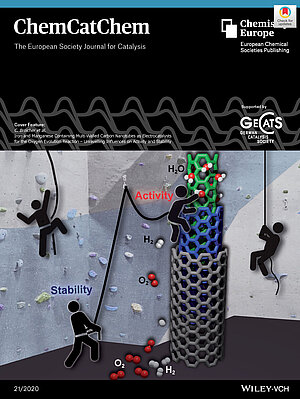By splitting water electrochemically, green hydrogen can be produced, which can be used as fuel, energy storage and for chemical reactions. This way, we can decrease our dependence on fossil resources and reduce greenhouse gas emissions. However, the electrolysis of water consumes a lot of energy. Especially the oxidation reaction to oxygen at the anode is very energy-intensive.
In order to efficiently split water, researchers at the Max Planck Institute for Chemical Energy Conversion in collaboration with researchers from the Technical University of Berlin, the RWTH Aachen University and the Federal Institute for Materials Research and Testing in Berlin have developed new electrode materials for the oxidation of water. The results of this study and a cover feature were recently published in the journal ChemCatChem.
Please find further information on the publication in our press release.
Original Publication: Broicher, C., Zeng, F., Pfänder, N., Frisch, M., Bisswanger, T., Radnik, J., Stockmann, J., Palkovits, S., Beine, K., Palkovits, R. (2020). Iron‐ and Manganese‐Containing Multi‐Walled Carbon Nanotubes as Electrocatalysts for the Oxygen Evolution Reaction ‐ Unravelling Influences on Activity and Stability. ChemCatChem 12 (6), 4698-4957. https://doi.org/10.1002/cctc.202001564

